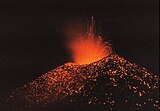The Central America Portal

Central America is a subregion of North America. Its political boundaries are defined as bordering Mexico to the north, Colombia to the southeast, the Caribbean to the east, and the Pacific Ocean to the southwest. Central America is usually defined as consisting of seven countries: Belize, Costa Rica, El Salvador, Guatemala, Honduras, Nicaragua, and Panama. Within Central America is the Mesoamerican biodiversity hotspot, which extends from southern Mexico to southeastern Panama. Due to the presence of several active geologic faults and the Central America Volcanic Arc, there is a high amount of seismic activity in the region, such as volcanic eruptions and earthquakes, which has resulted in death, injury, and property damage.
In the pre-Columbian era, Central America was inhabited by the Indigenous peoples of Mesoamerica to the north and west and the Isthmo-Colombian peoples to the south and east. Following the Spanish expedition of Christopher Columbus' voyages to the Americas, Spain began to colonize the Americas. From 1609 to 1821, the majority of Central American territories (except for what would become Belize and Panama, and including the modern Mexican state of Chiapas) were governed by the viceroyalty of New Spain from Mexico City as the Captaincy General of Guatemala. On 24 August 1821, Spanish Viceroy Juan de O'Donojú signed the Treaty of Córdoba, which established New Spain's independence from Spain. On 15 September 1821, the Act of Independence of Central America was enacted to announce Central America's separation from the Spanish Empire and provide for the establishment of a new Central American state. Some of New Spain's provinces in the Central American region (i.e. what would become Guatemala, Honduras, El Salvador, Nicaragua and Costa Rica) were annexed to the First Mexican Empire; however in 1823 they seceded from Mexico to form the Federal Republic of Central America until 1838. (Full article...)
Selected article

The El Salvador national football team (Spanish: Selección de fútbol de El Salvador), known as La Selecta ("the National Team"), represents El Salvador in international football, and is governed by the Salvadoran Football Federation (FESFUT).
The national team's first match was played in September 1921, when they were invited to participate in a tournament to celebrate 100 years of Central American Independence. (Full article...)
Did you know...
- ... that composer Gonzalo Brenes was a politician in the National Assembly of Panama and served for seven years as Panama's secretary of culture?
- ... that the Electriquette was an electric wicker vehicle that could be rented at the 1915 Panama–California Exposition?
- ... that Panama cross-banded tree frog males synchronize their mating calls to confuse predators that locate them by sound?
- ... that in August 2021 Sheika Scott became the youngest player to score in the Costa Rican Women's Premier Division, at just 14 years old?
- ... that Alfredo Frohlich formed an award-winning collection of Panamanian postal history that included items from as early as 1777?
- ... that the Corozal was the most powerful dredger ever built when she was launched in 1911 to work on the Panama Canal?
- ... that footballer Alexandra Pinell scored the Costa Rica U20 team's only goal at the FIFA tournament hosted by their country?
- ... that Swedish naval officer Axel Lagerbielke was imprisoned in Lima for over a year, held in Callao and eventually escaped from Panama on an English packet boat to Jamaica?
Related portals
Get involved
For editor resources and to collaborate with other editors on improving Wikipedia's Central America-related articles, see WikiProject Central America.
Need help?
Do you have a question about Central America that you can't find the answer to?
Consider asking it at the Wikipedia reference desk.
General images
In the news
- 22 November 2024 –
- Nicaraguan lawmakers vote unanimously to approve a constitutional amendment that strengthens the political power of President Daniel Ortega and makes his wife and Vice President Rosario Murillo "co-president". (Confidencial) (Al Jazeera)
- 17 November 2024 – 2024 Atlantic hurricane season
- Tropical Storm Sara makes landfall in Belize after causing flooding in Honduras. (AP)
- 28 October 2024 – Mexican Drug War
- In the last four days, at least 34 people have been killed in Tecpan de Galeana, Guerrero, Mexico, in cartel ambushes and clashes. Mexican police arrest 21 people, including sixteen Guatemalan and Salvadoran nationals. (Revista Proceso) (El Debate)
- 11 October 2024 – Foreign relations of Nicaragua, Foreign relations of Israel
- Nicaragua formally breaks off diplomatic relations with Israel, calling the Israeli government "fascist" and "genocidal". (Reuters)
Subcategories
Topics
Associated Wikimedia
The following Wikimedia Foundation sister projects provide more on this subject:
-
Commons
Free media repository -
Wikibooks
Free textbooks and manuals -
Wikidata
Free knowledge base -
Wikinews
Free-content news -
Wikiquote
Collection of quotations -
Wikisource
Free-content library -
Wikiversity
Free learning tools -
Wiktionary
Dictionary and thesaurus







































![Image 41Mesoamerica and Central America in the 16th century before Spanish arrival [according to whom?] (from Mesoamerica)](http://upload.wikimedia.org/wikipedia/commons/thumb/0/06/Mesoam%C3%A9rica_y_Centroamerica_prehispanica_siglo_XVI.svg/120px-Mesoam%C3%A9rica_y_Centroamerica_prehispanica_siglo_XVI.svg.png)



























